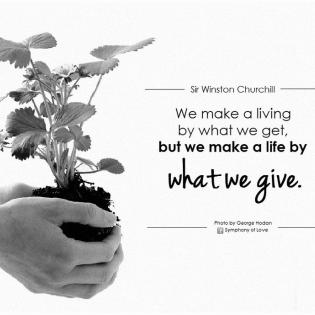Time Equals Treasure
Youth Activity: Participants discover how their time can equal dollars to help their community. See the handout for supplemental faith-based discussion questions.
“My call tonight is for every American to commit at least two years, or 4,000 hours, over the rest of your lifetime to the service of your neighbors and your nation.” ~President George W. Bush, 2003 State of the Union Address
The youth will
- determine the equivalent financial value of the time they give as volunteers in their community.
- reflect on the value volunteers donate to the community
Before this activity, look up the minimum wage rate in your state.
Talk with their family members about why they volunteer and what value they think they are giving to the community in dollars and other impacts.
- What is the financial value of volunteering to our community?
- What would happen in our communities if no one volunteered? How would our community be different?
Independent Sector The Value of Volunteering.
Instructions
Ask the participants whether they would like to give $20 to a local animal shelter. Listen to what participants say about giving their own money. Participants may say that they would like to give the money, but they do not have that much money.
Tell them that today they will learn how time equals money and that they do have valuable assets to give to the animal shelter and other needs in the community. Today we will look at how the value of time equals treasure or dollars that can be given to their community through volunteering.
Together, look up the minimum wage in their state. Talk about how working at a job is one way to trade your time for money. Employers need your help and are willing to pay you that value for your time.
Nonprofit organizations rely on dollars and volunteers to do their work. If they didn't have volunteers, they would need more money to pay employees. When you give your time for an hour, you are saving them an hour of minimum wage. Your volunteer hours have a financial value to the organization and the economy. That is a pretty cool thought.
Look up what the organization Independent Sector says about the value of volunteering.
Working in groups of 2-4 people, write down some ways they could take action with their time in the community. Assist the teams to think about what they might do individually or as a group to volunteer in their community.
Once the teams have created their lists of how they could volunteer, ask them to calculate how much time their volunteering would take in a week and the financial value of their contribution. For example, after visiting someone in a nursing home for two hours and picking up trash in the neighborhood for one hour, they multiply 3 hours x minimum wage to get a dollar amount.
Each team should come up with the total hours and multiply the number by the minimum wage. They each write their formulas on chart paper with the other groups. Reflect on the collective value of their time and financial contribution.
Tell them that although they are volunteers, their work has a value to society. Volunteers throughout all communities have a monetary value. According to the Census, about 60 million people volunteer each year. The value of a volunteer hour for adults is around $30 per hour rather than minimum wage.
Ask the participants to estimate what the total dollar amount would be if all the youth in their school were involved in volunteering. This would illustrate the impact of young people volunteering to their community.
Ask again, now that they know their volunteer time has financial value, who has $20 dollars that they would like to give to the animal shelter.
